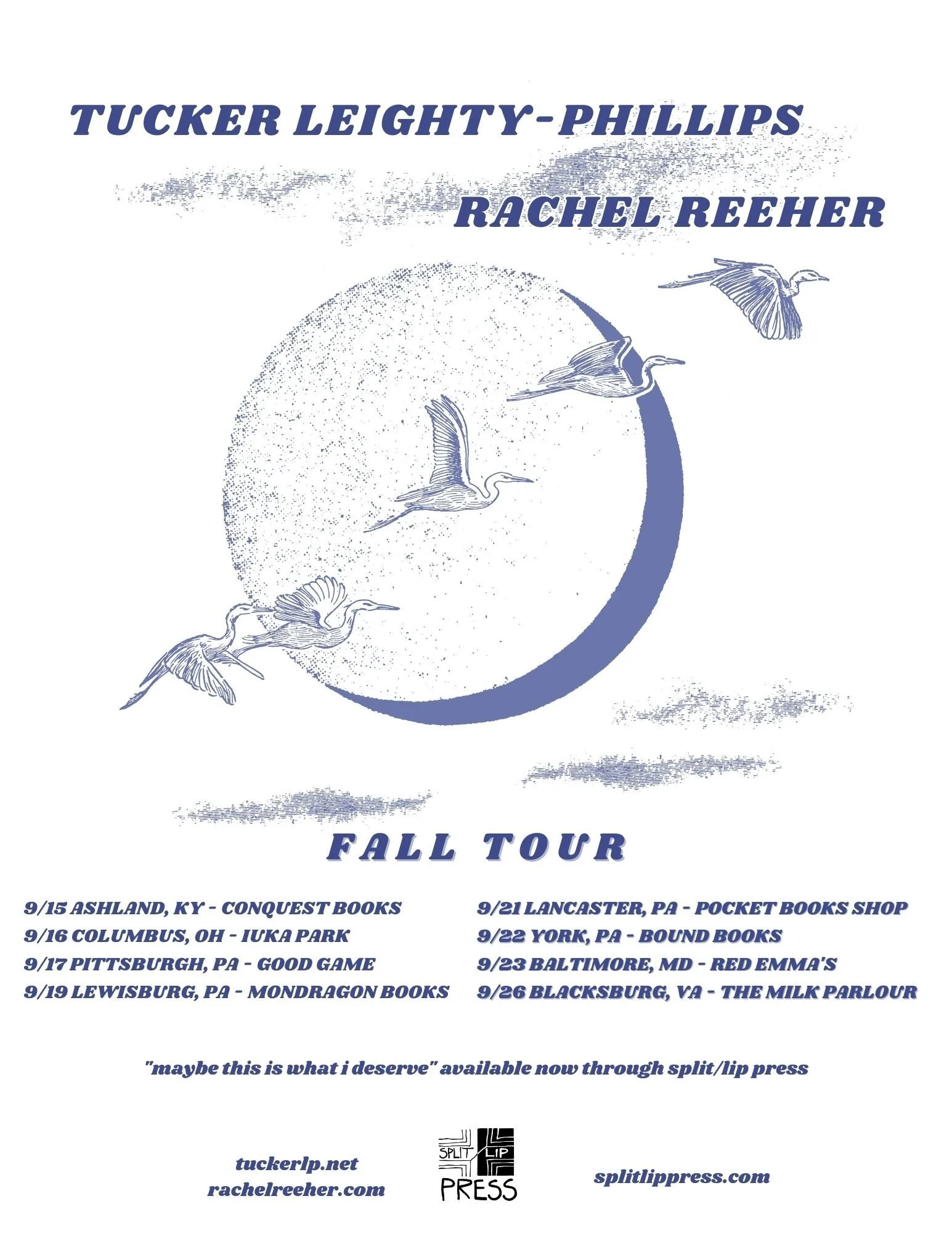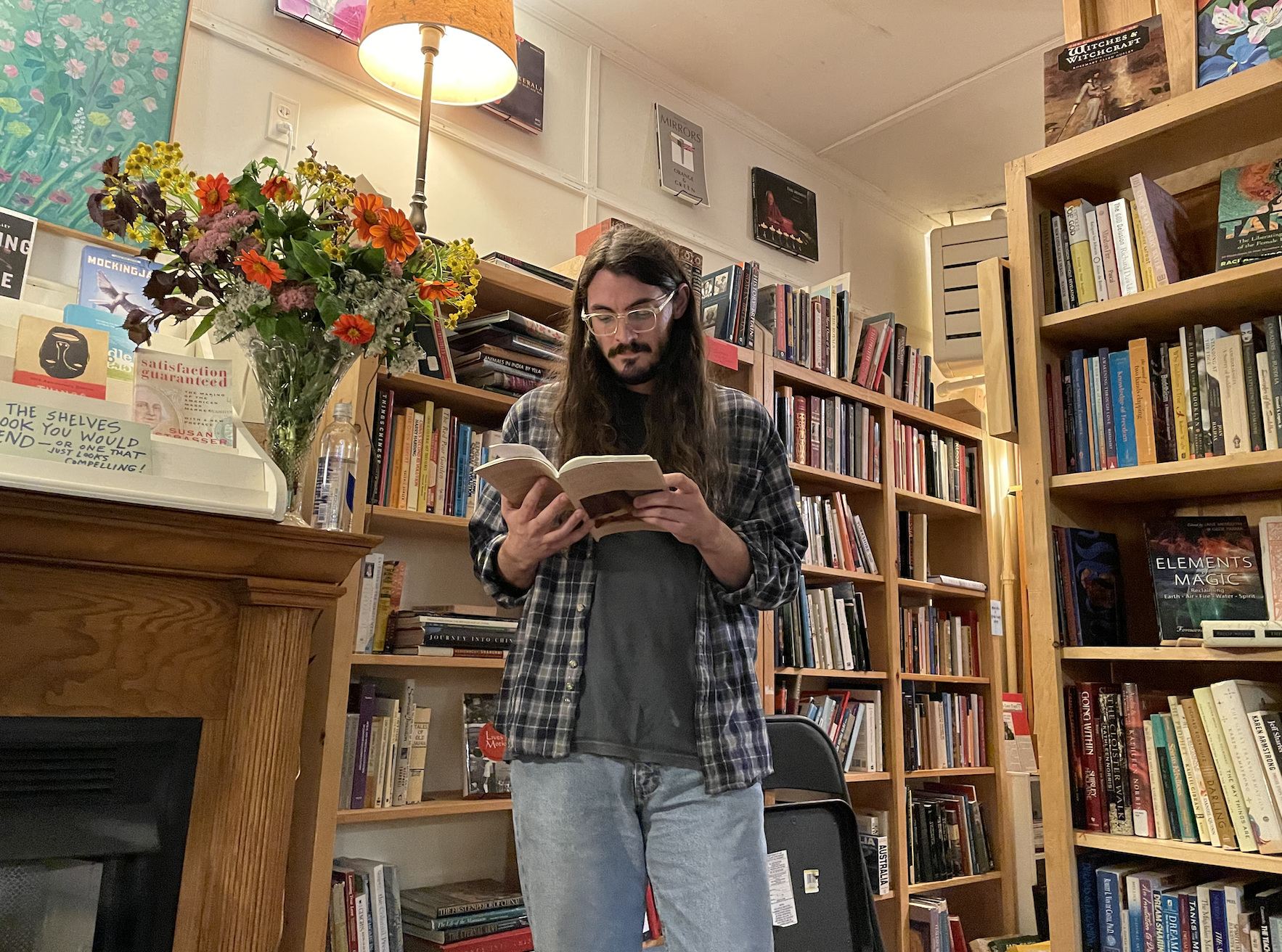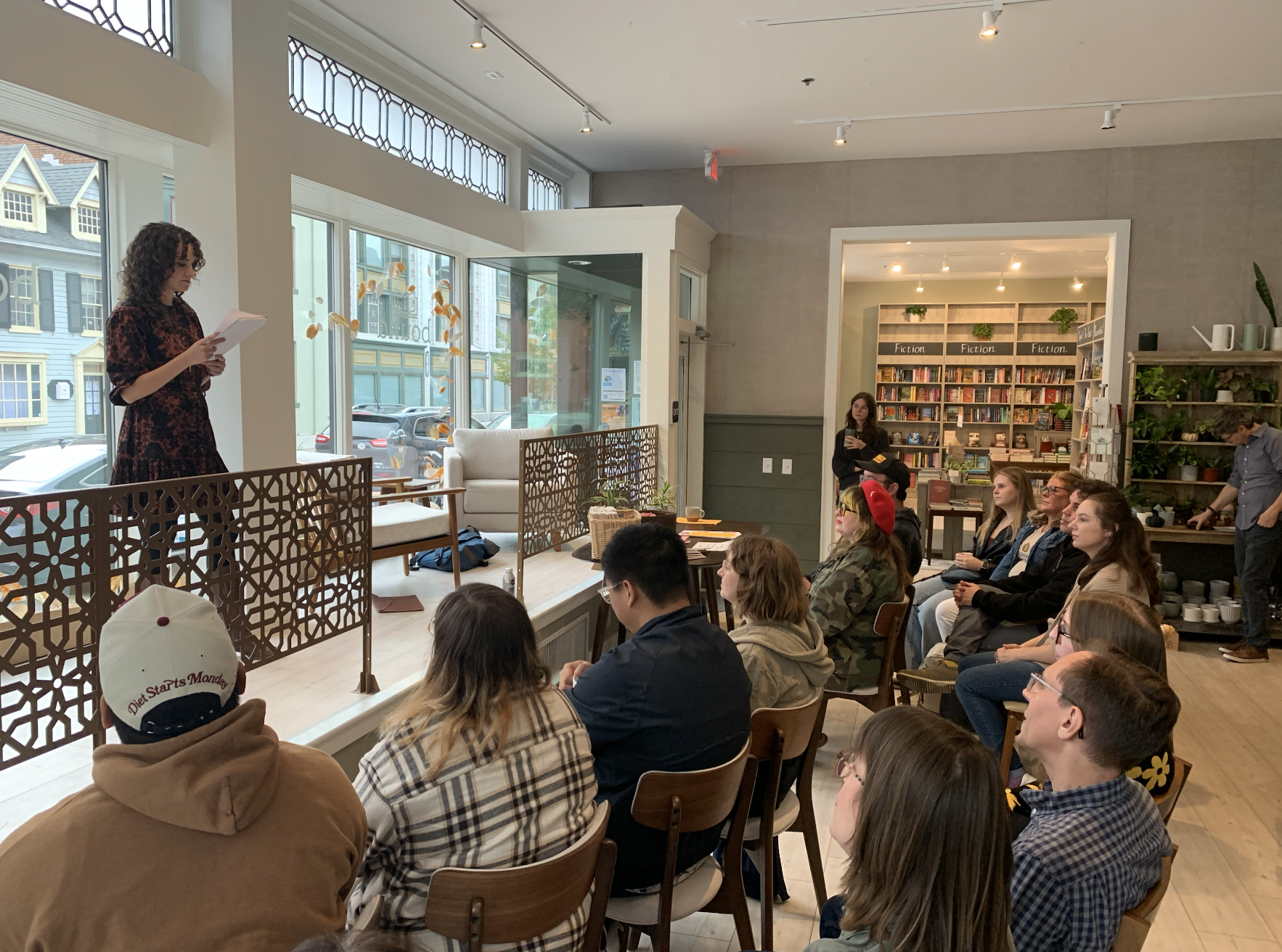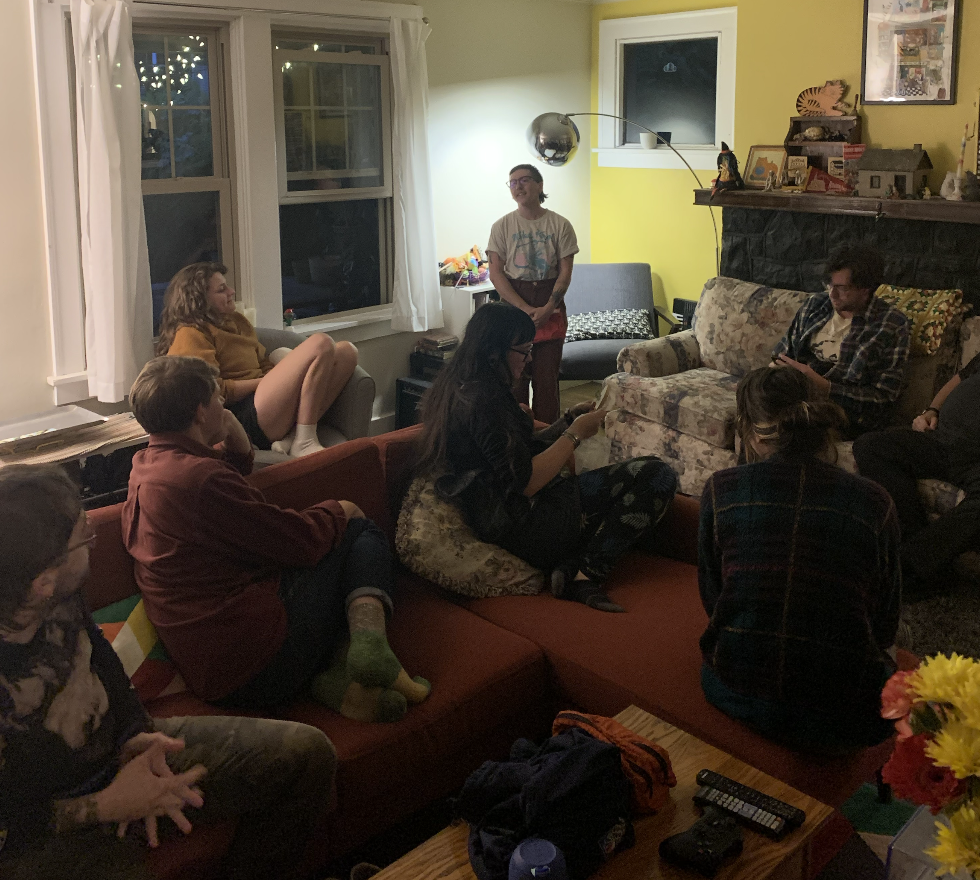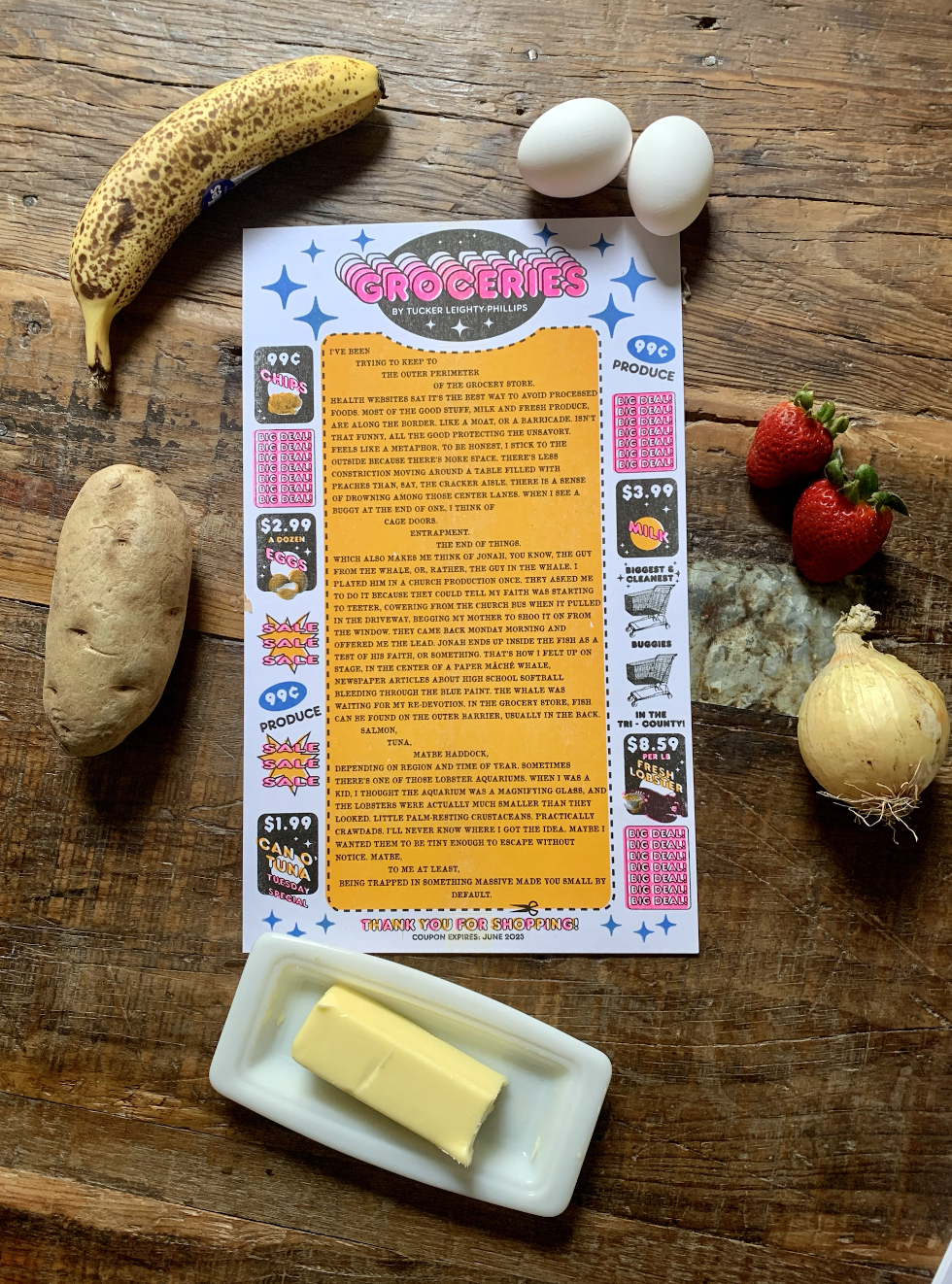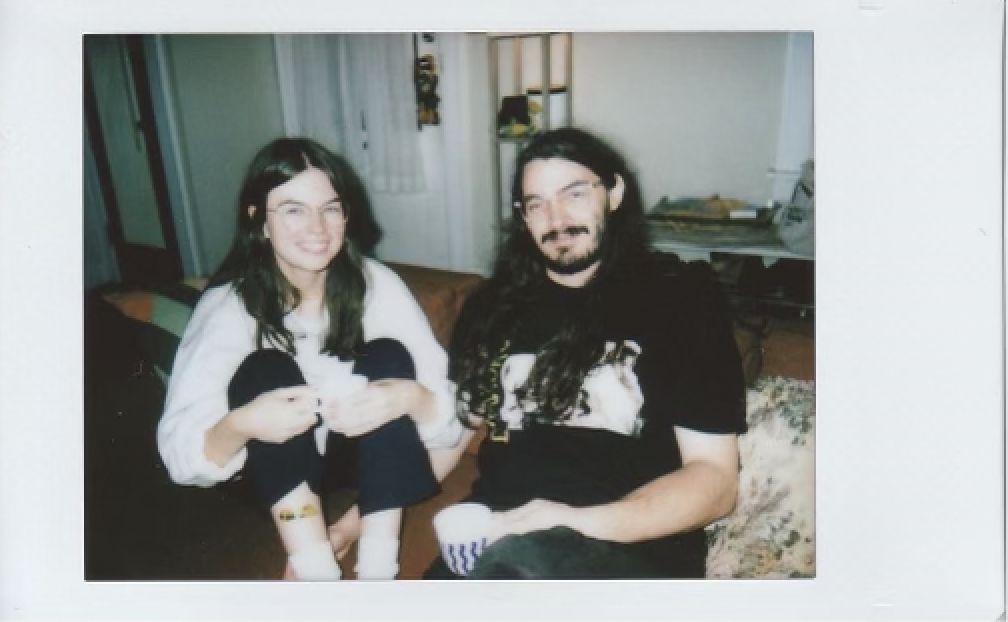So You Wanna Book a Book Tour?
So You Wanna Book a Book Tour: What Writers Can Learn From DIY Musicians
Last Summer, I published my first chapbook with Split/Lip Press, a short story collection entitled Maybe This Is What I Deserve. I made the decision to pursue writing after years working in the music industry; as a show promoter, tour manager, and merch person for a number of national touring bands. Despite my constant proximity to art, I was not a practicing artist myself; I couldn’t even play an instrument. I was envious of my musical friends, and when I left the industry to attend college, I took a couple of creative writing classes and discovered my own aptitude and passion for the craft. There was no doubt in my mind, if I ever published a book, I would do a tour of my own. And in September 2023, I embarked on a twelve-day tour with fellow writer (and my now-fiancée!) Rachel Reeher.
I spent months planning every intricate detail, using the knowledge from my time in the music industry to coordinate and stylize my tour; making it feel as ambitious and unique as I had dreamed it would be. As I continue writing and planning my next slate of performances, I thought it might be useful to create a primer for other writers interested in organizing a DIY book tour; covering topics like tour routing, venue selection, community building, and covering your costs.
1. Find Your Anchor
When you’re organizing a tour, you want to think about your goals. What do you want the tour to accomplish, logistically? Where do you want to go? Perhaps you’re traveling towards a conference, (like AWP), or there’s a venue you’re really wanting to perform at in a faraway city, or friends you’d like to see up the coast. Either way, deciding on your anchor first is a great way to build out a routing. The anchor is the logistical central point of the tour–the primary reason for your route. For my release tour, I wanted to visit central PA, namely Lewisburg and Lancaster, two places where I had previously lived and still have a significant crop of friends. I knew these would be great shows, so I built a loose itinerary around making it from Kentucky to Central PA, and asked myself what possible cities could fill the space between. The routes to meet those anchors took many shapes. Originally, my route looked like this: Hazard (KY) > Charleston (WV) > Morgantown (WV) > Pittsburgh (PA) > Lewisburg (PA), with my road from PA being Baltimore (MD) > Richmond (VA) > Roanoke (VA). But ultimately, my plans changed, and led me to places I didn’t anticipate.
2. Let Your Date Decide The Venue, Don’t Let Your Venue Decide The Date
A friend who also recently wrote and toured a new book asked me how I was able to make something so compact–he claimed that the venues he contacted only had limited availability, and nothing lined up in a cohesive way. One place would have a date in December, but another wasn’t available until February. He felt like he had no choice but to accept sporadic events, or choose between his options. So how did I work around this? My approach was very direct–I emailed every venue with a specific date in mind. In some cases, I had some wiggle room (perhaps I could do a day before or later, depending on the route, as I often include off-days around friends I want to see/cities I want to explore). But for the most part, I was firm. If a venue couldn’t make that day work, I would ask for contacts in the city and reach out to them with the same request. In some cases, I couldn’t find a venue for a specific city, and if I found myself grasping at straws, I would look into new cities or towns. As I mentioned, my original route had me going north through West Virginia, but I was struggling to make contact with West Virginia venues, so I played with Google Maps and settled upon a new route: instead of going north-east through WV, I would go north to Columbus, Ohio instead, and travel east from there. This opened up a series of possibilities for me, and although I didn’t personally know anyone in Columbus, I was put in touch with a wonderful poet named Clayton Spencer who organized a fantastic reading / show alongside a number of authors and musicians.
Speaking of the Columbus show–
Glen Echo Bird Tunnel in Columbus, Ohio.
3. There Are More Than Bookstores!
Clayton was dedicated to finding the perfect space for our event, and put me in touch with bookstores, coffee shops, bars, and other places in town, but nothing seemed to be coming through. He was working as a mediator more than an event promoter, but as rejections piled up, he decided to take things into his own hands, and organized the event himself. His venue? The Glen Echo Bird Tunnel, or in layperson’s terms, a tunnel covered in bird graffiti in the middle of a city park. I was initially hesitant–the idea of performing in such a public space made me feel weird; I imagined passersby heckling, people avoiding the area as if I was an unruly street preacher. But I also saw the dedication and enthusiasm from someone inspired by my work, willing to go to great lengths to organize a reading, and trusted my sense of adventure. And ultimately, the event was a hit! There were thirty-ish people gathered, and the way each performance echoed throughout the tunnel created a charming acoustic experience (it is the Glen Echo Tunnel, after all). Although I love and support independent bookstores, I also understand they are overloaded with requests from writers. I highly encourage expanding your search to include any venue you think would be exciting and kind to your work. Bookstores are obviously great venues for author events–they’re equipped with the know-how to handle the logistics and promotion, but do not be afraid to stray from the path. I’ve performed in coffee shops, art galleries, dive bars, living rooms, community centers, porches, and many other alternative spaces. And in many cases, these were communities without dedicated book shops who have thriving literary scenes of their own–you just had to seek it out.
You might also find some bookstores are open to events, but have no history of hosting them. Let this work in your favor–you can coordinate, plan, and celebrate a successful accomplishment together. Some of the bookstores that hosted our tour had not held an author event. In many ways, this was much more exciting. We were diving into the experience together, rather than being a cog in a well-oiled machine (even if being such a cog has its perks!).
4. Choose Your Weekdays Wisely!
Alongside my “anchor”; I was also acutely aware of which events would be well-attended, even on a weeknight, and let this guide my process. For example, I knew my Central PA events would likely be well-attended given my relationships there, so when I routed the dates, I placed those events midweek, and prioritized the weekends for my lesser-traveled cities, hoping to get more walk-up traffic for the events where I was more concerned about attendance. Many bands take Mondays off, knowing that attendance will wane on those days, no matter the city. People don’t like to attend Monday shows! As you’re routing, try to estimate what your attendance might be for some of the events–check the social media pages for the bookstore/event promoter and try to gauge how many people their events draw. Are they typically on weekends? Do you know anyone there? It is important to be realistic about your expectations. Sometimes nobody shows up, no matter how much you calculate and plan, and that’s okay too! It’s part of the process. But, even if no attendees show, there are ways to still make the event a hit.
Columbus-based band Sweet Teeth performing at Glen Echo Bird Tunnel
5. Add Local Artists!
Poet JL Price reading at Bound Books in York, PA
Anyone who has ever toured in a band will tell you the importance of having local musicians on your shows. When you are a young, do-it-yourself touring act, you might not have a following yet, and when a place has lots of options for artistic events, you might be in tough competition to win folks over to come see your performance. This was one of my qualms with the more traditional bookstore author events–where were the locals? Could writers be sharing their platform more? For every event on my tour, I had 1-2 local artists take part alongside myself and Rachel. They were poets, musicians, essayists, visual artists, sound design engineers, and fiction writers. I cannot list all the benefits of these partnerships, but I can tell you three of the ones I felt most–
You build community relationships and see a sampling of the thriving arts communities existing all over the country.
Each event has its own atmosphere. You will be surprised how your work feels alongside other writers versus a shoegaze band versus a puppeteer.
Your attendance will be better! Each local artist is likely to draw their own crowd, but even if they don’t, you will at least be able to perform for each other (which, in its own way, is a type of relationship-building).
Poet Gem Fair reading at a house show in Pittsburgh, PA.
My book tour was special to me–it was something I’d been dreaming of for a decade. Years ago, I was a tour manager for a series of punk bands, and saw the emotional gratification of being able to travel the country and share your art with others. Oftentimes, I was the only one in the van who wasn’t celebrating that achievement. In some ways, I felt like a voyeur to an experience that was not my own. I craved that feeling for myself. And now, looking back on my own tour, I think about each event and feel a sense of warmth that I was able to share the experience with so many artists. Many of them had never performed their work in a public forum, so this tour became a shared accomplishment. For me, that’s what grassroots touring should be–not a series of events to serve yourself, but a series of opportunities to build and nurture community.
And, another lesson from touring musicians–don’t “headline” over your locals, trust me! You might feel like the novelty act because you’ve come a long distance, but that also means people are less likely to know who you are, and less likely to want to stay to see you (especially after their friends have already taken the stage). For ideal attendance, you want to be sandwiched in-between them. People will come early and stay late for the folks they know.
6. Get Creative with Merchandise!
Story Broadside designed by Travis Geoghegan, printed by Devyn Park
When you’re on a book tour, costs will pile up. Gas, food, and lodging are expensive (on the last point, if you’re able, I recommend building tour dates around cities where you’ll have a place to stay. It cuts costs tremendously). Rachel and I wanted to recoup some of those expenses and get creative with tangible interpretations of our work. Rachel hand-printed a series of zines featuring her short story “Lobster” (originally published in Smokelong Quarterly). Not only did I have my chapbook, but I also had a risograph print created featuring my story “Groceries” (originally published in Moon City Review). The print was designed by Travis Geoghegan and printed by Devyn Park. Having a merch table was integral to the tour not breaking our bank; attendees wanted to support our travels, take home a souvenir, and we had easily prepared tokens of gratitude for people who helped us along the way.
And one final suggestion;
A polaroid of Rachel and me, taken by our friend/poet/favorite wrestling announcer, Gem Fair.
7. Be Patient, Be Kind, Be Humble
When working with venues and promoters, especially ones without much formal experience, it is important to be humble and kind (although I would argue that it is always important to be those things). There is a chance that mistakes will be made, or unexpected circumstances will arise, or local artists will drop. Yes, going on tour is exciting. Yes, it can feel good to attend a bunch of events held in your honor. But don’t get too big for your britches! Remember that community arts don’t happen without all of us. Everyone involved with an event is working to uplift and support one another, and much of your community-building efforts happen long in advance of the actual event itself. The more enthusiastic and gracious you are in the planning process, the more excited each promoter will be to hold your event. Establishing a community arts scene is an ambitious, time-consuming, and vulnerable act, and it takes courage to take the first step. Let’s honor that courage, and return the favor in our own backyards.
Thanks for reading! If you have any questions about DIY Book Touring, feel free to send me an email. If you found this guide useful, feel free to say thanks by picking up a copy of my collection or adding it to your Goodreads!
